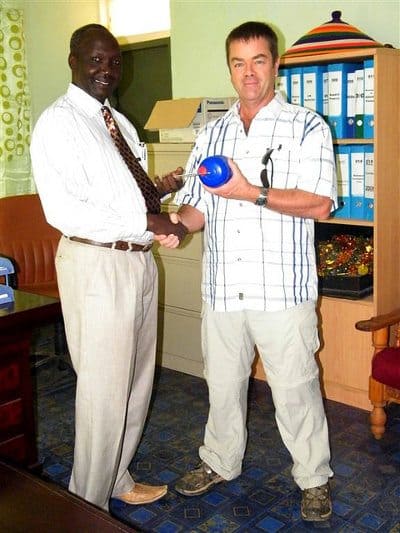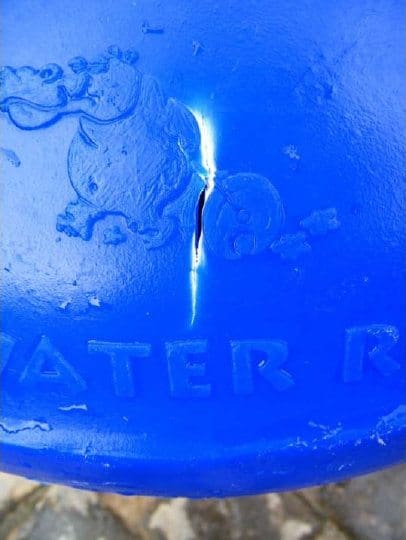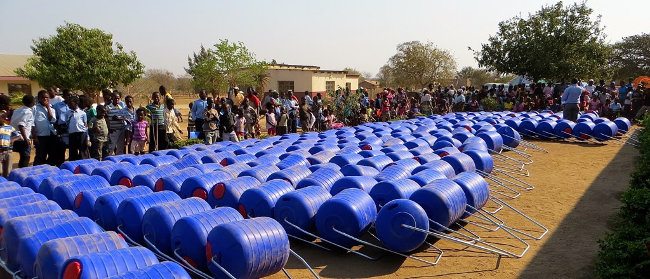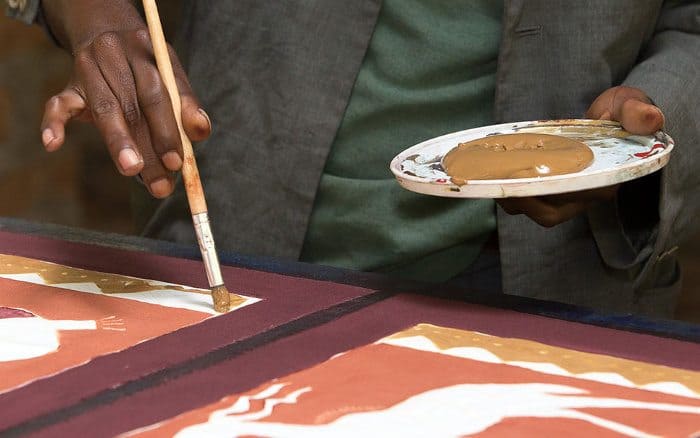
In today’s interview we have the pleasure to welcome Grant Gibbs, Executive Director of the Hippo Water Roller Project. Mr Gibbs, thanks for your time.
First things first. Tell us a little about who you are, where you’re from, and how you got into this fascinating project. I believe you’ve now been involved in the business for the past +20 years or so.

I actually started in the IT industry (Wang Computers), and in 1993 was looking for something more fulfilling. After finding the Hippo Water Roller, my relationship with the inventors grew to a point where I eventually took ownership and I have been distributing Hippo Water Rollers for about 23 years now, with the aid of donor funding and sponsorships. It has certainly been challenging but equally rewarding – the need is so great and there is much more to do!
What immediately struck me when I was introduced to the concept is both its ingenuity and relative “simplicity”. In other words, an idea doesn’t have to be complex to be useful.
When did the Hippo Water Roller project originate and who created it? Also, why did you choose the “hippo” to symbolise your organisation?

You’re absolutely right – we consider the Hippo Water Roller appropriate technology. Often first world solutions are not feasible in third world conditions.
The Hippo Water Roller was “invented” (or as many would prefer: “innovated”) in 1991 by two South African engineers, Johan Jonker and Pettie Petzer. They worked in the arms industry, but grew up on farms, and were exposed to the daily struggle of women and children in rural areas. First they tried to design a wheelbarrow but realised that the biggest cost was the wheel.
We decided to use the Hippo to symbolise the roller, as a Hippopotamus “lives” in water, is large and round, and also has a very thick skin – this epitomises the Hippo Water Roller shape and origin.

Water access is a huge issue, whether in Africa or worldwide. Presently, at least one billion people on our planet don’t have access to water in their homes. What are some of the struggles encountered by local communities, and how does your solution contributes to a better society?

Some of the struggles by local communities, and I’m sure in many other developing countries around the world, is that the task of fetching water is often left to the women and children. As they spend many hours a day collecting water, this has a knock-on effect whereby they have less time for other tasks in the home, sustainable gardening, seeking employment, or attending school – this essentially means that they are unable to break free from the poverty cycle.
Additionally, the health problems caused by carrying heavy loads on their heads daily are immense. Unfortunately, it is also a sad reality that young girls and women also fall prey to abuse and sexual violence while collecting water, as they are vulnerable in the early hours of the day and in the evenings.

The Hippo Water Roller allows women and children to collect more water at a time, and transport it back home with less effort, freeing up time for school and other tasks. They now do not have to experience health issues related to carrying water, and are also less vulnerable by being able to collect water once a day, instead of multiple trips. We have noticed a positive culture change in that men are proud to be seen using this technology, and are now helping collect water.
As of today, how many people have been impacted by your product, and in how many countries? Is your focus primarily in Africa, or do you also work on other continents?

Approximately 45 000 – 50 000 Hippo Rollers have been distributed in about 25 countries. If we work on the UN average of around 7 members per rural household, then that equates to 300 000+ direct beneficiaries.
Most Hippo Rollers have been distributed in Africa, however we have sent small batches to other parts of the world, and have a lot of interest from many more. The Hippo Roller provides a flexible infrastructure, to access different water sources, which change throughout the year, depending on rainfall patterns and water table levels.
How affordable is the Hippo Water Roller, and what can you tell us about the product’s durability? Some places out there have rough terrain, so it must’ve been quite a challenge to come up with something that is both cost-effective and long-lasting.

Yes, you are right. In order to make the Hippo Roller durable and maintenance free, the cost is high. 95% of Hippo Rollers have been sponsored, the people who need them most, cannot afford to buy them. Although the cost per person per year is actually minimal (less than $4 pa), it is difficult to outlay the whole amount upfront.
The Hippo Water Roller has a lifespan of 5-7 years, and often 10 years and more. Yes, we could make it cheaper, or we could add many other features, however, we find that exactly as it is, is the ideal balance. Being maintenance free for the lifespan of the product is also essential due to the remote location of most communities.
Drop test: Here’s what happens when a full 90kg roller falls from an unusual height of 2.2 meters (7 feet) and smashes into a solid concrete floor…

Conclusion? Minimal damage (just a small crack appeared at the top of the drum)!

Is the Hippo Water Roller environmentally-friendly, and what happens to it once it becomes too old? Do you encourage recycling?

In terms of recycling, we could not practically and logistically collect old rollers for recycling. However, in developing countries, people are extremely innovative in finding new uses for old things – so when the rollers eventually get to that stage, you find them being used as troughs to feed animals, bathing children, and storage bins.
Over the years you’ve developed additional features to the product. What can you tell us about the Hippo Spaza, for instance, or the added benefits of the Utility Cap? Do you have any other plans to expand your product range?

We have developed additional features to the Hippo Roller – the Utility Cap provides a more hygienic way to extract water without contaminating the contents, and is an easier way to water veggie gardens (as it can be opened while the roller is being rolled along the ground); it can also be used to add a filter to provide clean drinking water, and many other uses.
The Hippo Spaza is an attachment that fits together with the standard Hippo Water Roller and the handle forms part of the Spaza stand. It is basically a “trolley / cart” attachment which allows for easy transport of goods to the market, and sets up into a display stand once there, with shade covering, and the Hippo drum is used as seating. This product supports entrepreneurs and enterprise development – now the small-scale farmer can more easily transport and sell his products at the market.

By now people are probably hooked (I know I am)! 🙂 Are there ways to get involved with what you do? Can people make a donation or sponsor communities in one way or another? After all, I’m sure those most in need require help to gain access to your services…

Yes, absolutely. You can either make a donation, or start your own crowdfunding campaign on our site. We also appeal to corporate companies to use the Hippo Water Roller as a basis for their Corporate Social Investment/Responsibility Initiatives, as providing improved water access can only aid their other social upliftment endeavours.
If there isn’t a specific community you have in mind, we can find one for you. We work with community leaders to select beneficiaries, and they mostly choose the elderly, disabled, child-headed homes, and those furthest from the water points.
Ultimately, where do you see the project going let’s say 20 years from now? Ideally speaking, what would your “wildest dream” be? 😉 If you have anything else to add, feel free to do so…

My wildest dream for Hippo Water Roller would be to reduce the total number of people without adequate access to water by just 1%. That might not seem like a very ambitious goal, but to put it in perspective, that would require us distributing 10 000 every month for 12 years to achieve 1% – that’s how massive the need is.
“Your idea doesn’t have to be complicated to be useful” * Hashem Al Ghaili
—
That’s a fabulous goal! A huge thank you Mr Gibbs! And keep up the incredible work: I’m sure your story will inspire people to make a difference.
“You must be the change you wish to see in the world.” * Mahatma Gandhi



Yes great idea but where can you buy them and how much do they cost?
What people in Africa really need is access to decent clean water to drink. It is really outrageous that in this day and age they do not have it.
Also they need access to electricity or solar. We in the West are really selfish when we have so much and do not share.
I have loved Hippo water roller. how can I access it in Uganda?